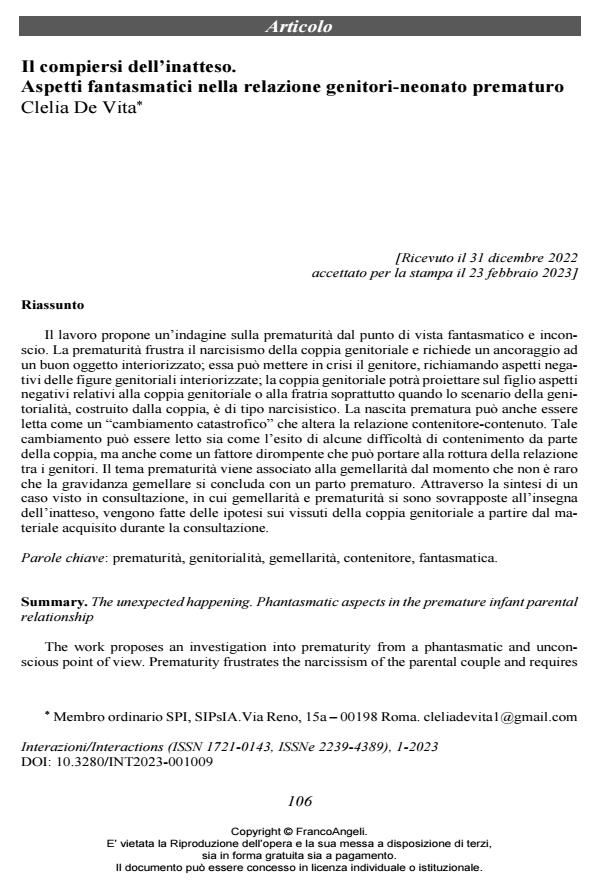The unexpected happening. Phantasmatic aspects in the premature infant parental relationship
Journal title INTERAZIONI
Author/s Clelia De Vita
Publishing Year 2023 Issue 2023/1
Language Italian Pages 18 P. 106-123 File size 195 KB
DOI 10.3280/INT2023-001009
DOI is like a bar code for intellectual property: to have more infomation
click here
Below, you can see the article first page
If you want to buy this article in PDF format, you can do it, following the instructions to buy download credits

FrancoAngeli is member of Publishers International Linking Association, Inc (PILA), a not-for-profit association which run the CrossRef service enabling links to and from online scholarly content.
The work proposes an investigation into prematurity from a phantasmatic and unconscious point of view. Prematurity frustrates the narcissism of the parental couple and requires anchor-ing to a good internalized object; it can put the parent in crisis, recalling negative aspects of internalized parental figures; the parental couple may project onto the child negative aspects relating to the parental couple or sibling, especially when the parenting scenario, constructed by the couple, is of the narcissistic type. Premature birth can also be read as a "catastrophic change" that alters the container-contained relationship. This change can be read both as the result of some containment difficulties on the part of the couple, but also as a disruptive factor that can lead to the rupture of the relationship between the parents. The theme of prematurity is associated with twins, since it is not uncommon for a twin pregnancy to end in a premature birth. Through the synthesis of a case, seen in consultation, in which twinning and prematurity overlap under the banner of the unexpected, hypotheses are made on the experiences of the parental couple starting from the material acquired during the consultation.
Keywords: prematurity, parenthood, twinning, container, ghostly.
- Aulagnier P. (1975). La violenza dell’interpretazione. Roma: Borla, 1994.
- Benvenuto S. (2003). Differenza, identità, violenza. Conversazione con René Girard. Dialegesthai – Rivista di filosofia, 5. Rivista online.
- Beebe B., Lachmann F.M. (1988). Infant research e trattamento degli adulti. Milano: Raffaello Cortina, 2003.
- Bion W.R. (1974). Il cambiamento catastrofico. Torino: Loescher, 1981.
- De Benedetti R. (1976). Formazione del Sé e prima realtà interna. Rivista di Psicoanalisi, 22, 2: 206-225.
- Fajardo B. (1987a). Neonatal Trauma and Early Development. The Annual of Psychoanalysis, 15: 233-244.
- Fajardo B. (1987b). Parenting a damaged child ‒ Mourning, Regression, and Disappointment. Psychoanalytic Review, 74, 1: 19-42.
- Fraiberg S. (1980). Il sostegno allo sviluppo. Milano: Raffaello Cortina, 1999.
- Freud S. (1925). Inibizione, sintomo e angoscia. OSF, vol. 9. Torino: Bollati Boringhieri.
- Mintzer D., Als H., Tronick E.Z., Brazelton M.D. (1984). Parenting with a birth defect. The regulation of Self-esteem. The Psychoanalytic Study of the Child, 39, 1: 561-589. DOI: 10.1080/00797308.1984.1182344
- Klein M. (1940). Il lutto e la sua connessione con gli stati maniaco-depressivi. In Klein M., Scritti 1921-1958. Torino: Bollati Boringhieri.
- Latmiral S. (2001). Pensieri prematuri. Roma: Borla.
- Magazzeni L. (2015). Il suono. Milano: Lavitafelice.
- Manzano J., Palacio Espasa F., Zilkha N. (2001). Scenari della genitorialità. Milano: Raffaello Cortina.
- Nicolò A.M. (2015). Famiglie in trasformazione. Milano: FrancoAngeli.
- Palacio Espasa F. et al. (2001). Scenari della genitorialità. Milano: Raffaello Cortina.
- Pierrehumbert B., Nicole A., Muller-Nix C., Forcada-Guex M., Ansermet F. (2003). Parental post-traumatic reactions after premature birth: implications for sleeping and eating problems in the infant. Archives of Disease in Childhood-Fetal and Neonatal Edition, 88, 5: F400-F404.
- Shore A. N. (2008). La regolazione degli affetti e la riparazione del Sé. Roma: Astrolabio.
- Stern D. (1995). La costellazione materna primaria. Torino: Bollati Boringhieri.
- Winnicott D.W. (1947). L’odio nel controtransfert. Firenze: Martinelli, 1975.
Clelia De Vita, Il compiersi dell’inatteso. Aspetti fantasmatici nella relazione genitori-neonato prematuro in "INTERAZIONI" 1/2023, pp 106-123, DOI: 10.3280/INT2023-001009